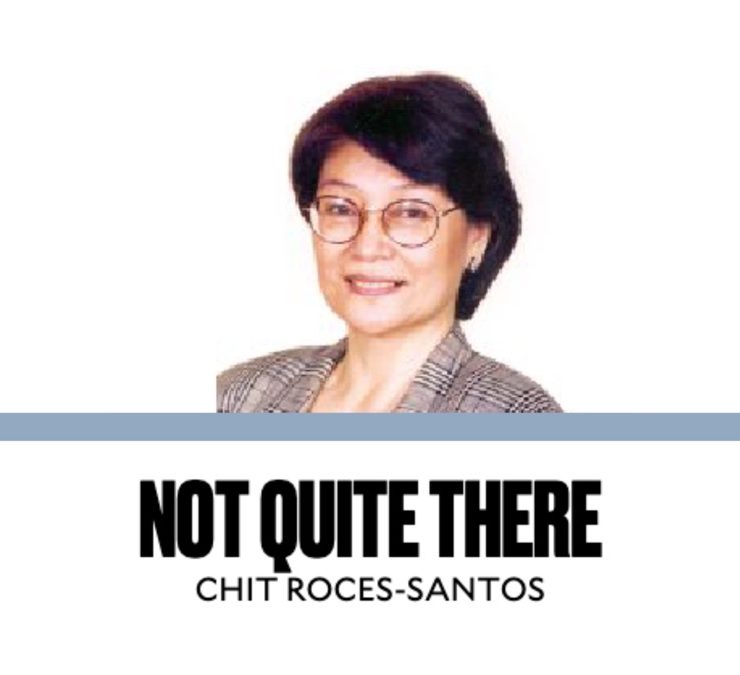The barangay as our first and last recourse

My husband and I now regard attending barangay meetings as part of our patriotic duties. We’ve not felt too sure if our votes are counted anymore since computers took over our elections, with all those glitches and other irregularities all happening unseen, unlike before when we wrote in our votes and these were counted manually before our eyes, if we cared to look.
It’s also pretty discouraging to see many misfits defeat better qualified rivals for Congress in particular. I’m almost embarrassed to say now my father was a congressman—from 1953 until martial law cut short his fifth term.
Once upon a time, writing to our congressmen was an effective tool to get some action done. Of course, we also had a boldly free press.
Well, things are, indeed, greatly changed. And what now can people like us really do? We have decided that the last line of defense for democracy is the barangay. It’s our neighborhood, as distinguished from our district—districts are a lost or corrupted representation of communities in Congress.
Qualified officials
We’re lucky our barangay is a very active and involved community: It demands efficiency and honesty from our elected officials. These officials themselves seem qualified enough for their jobs, but we’re not taking any chances. A good number of us have, in fact, taken it upon ourselves to act as watchdog, reporting inefficiencies and shortcomings at first notice, following up these complaints and demanding quick solutions.
And our officials seem responsive enough, a virtue not easily acquired in a neighborhood where, by its very nature, power and responsibility are not so clearly delineated; where in at least one case, living is demarcated by exclusive-village gates and perimeter walls; where condominium life admits numerous transients; and where certain streets and facilities belong to an old-family conglomerate, the Ayalas, run and secured by it on practically its own terms and in its own interest.
But all in all, politics at the barangay level is reasonably managed, unlike in Congress. Life is good, especially for seniors like us, and safe. Still, taking lessons from national and upper level politics, citizens should not allow their vigilance to wane.
At our first barangay meeting this year, the hall had five or six front rows filled, mostly by senior ladies and a few husbands. Further down were younger parents, mostly mothers, and even younger citizens. Still, I wish we had been more. We had gone early because we had a birthday lunch we couldn’t miss for an uncle—he was celebrating his 94th.
The barangay officials were introduced to us one by one. However, before we could even begin the meeting, we found ourselves watching a video opening with President Marcos Jr. reviewing the troops. It was a rather lengthy presentation of propaganda reminiscent of the martial law regime under his father. It was inserted at the behest of the Department of Interior and Local Government, which had a representative present.
Wrong breed
The theme was an unimaginative, unmistakable adaptation from “Bagong Lipunan” (“New Society”)—this time it was “Bagong Pilipino,” the phrase shown mouthed by different types of Filipino. The insinuation was that the Filipino before and after martial law is the wrong breed.
Bred before Marcos and happy and proud enough of that to be unwilling to be coopted into either of the Marcos breeds, my husband, Vergel, just had to say something as soon as the floor became open. He asked the barangay chair why the presentation.
“Out of courtesy,” the chairperson replied.
“Did you have a choice?” Vergel asked, and, upon being told, yes, the chairperson had a choice, proceeded to ask why the official chose to be “timid” and to surrender his “independence” as a political leader to the DILG and the Marcoses.
As for courtesy, Vergel, now back in his seat after the barangay chair became lost for words and got no help from anyone, told a younger citizen who came over to say thank you for expressing what she felt, “Courtesy? Surely the Marcoses scarcely deserve it.”
Others her age and some older ones, although definitely not older than us, also came over to show their like-mindedness, apologizing for being “too shy” themselves to speak up.
The meeting proceeded to be less political, and just as well—it addressed the practical everyday concerns of the barangay citizenry.
We had left for Uncle Quitos’ birthday lunch before the meeting closed. There we would all be seniors who lived through martial law. Politics has always had a place in such a gathering.


















